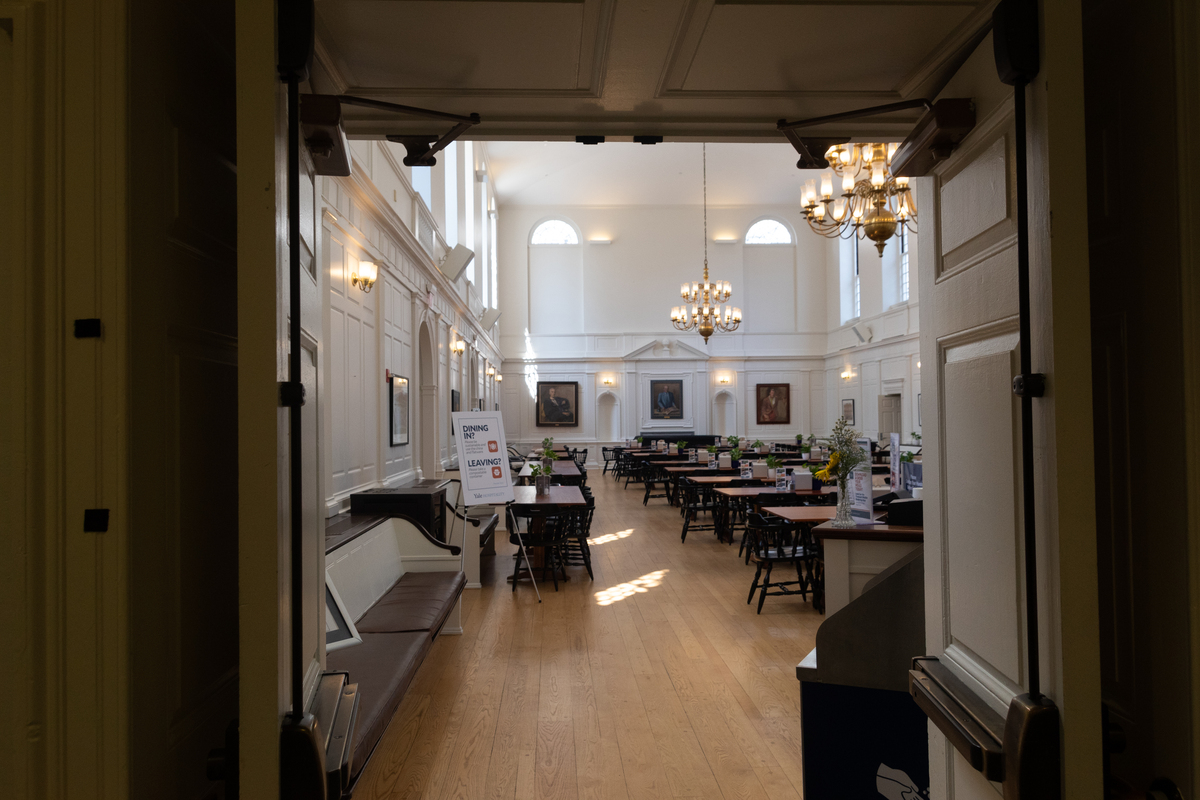Residential college dining halls reopen to faculty
Residential college dining halls have reopened to faculty and professors, allowing for professor-student meals to resume after a COVID-19 induced hiatus.

Zoe Berg, Photo Editor
For the first time since the start of the COVID-19 pandemic, faculty members were welcomed back into residential college dining halls in April 4.
Faculty can now use their meal swipes in residential college dining halls. Prior to the change, professors had to use their swipes at Commons or Steep Cafe in the Yale Science Building, drastically limiting the ways in which they could meet with students. Faculty of Arts and Sciences Dean Tamar Gendler outlined the policy change in an email to faculty in late March
“As you know, the FAS Dean’s Office provides subsidized lunches to full-time multi-year and ladder and instructional faculty in the FAS,” Gendler wrote in the email. “We are grateful for your flexibility during the past year, and delighted to announce that, beginning Monday, April 4, eligible faculty may resume using their FAS-supported dining privileges Monday through Friday in any of Yale’s fourteen residential college dining halls.”
Eligible faculty may continue to use their dining privileges at Commons and Steep Cafe.
The main purpose of the FAS subsidized lunch program is to “engage in the exchange of ideas and enjoy the collegiality of this intellectual community,” Gendler explained.
“We are grateful to the Heads of College and our colleagues in Yale Hospitality for making this program possible,” Gendler wrote in the email.
The email stated that the meal swipes would be charged directly to the Faculty of Arts and Sciences and that these swipes provided access to all residential college dining halls from 11 a.m. to 3 p.m., Monday through Friday.
“Hooray,” professor of law and political science Akhil Amar said on the policy change.
Typically, Amar said, he eats lunch with his students in the Davenport College dining hall after class. But due to the pandemic, he had to hold these meals in Commons instead.
This semester, Amar held two meals a week in Commons for his constitutional law class, which were typically attended by eight to ten students, he said.
“I want to express my gratitude to the administrators and staff at Commons who helped pick up this slack so I could meet with students at lunch,” Amar said.
Amar expressed his thanks to Dean of Yale College Marvin Chun, Vice Provost for Academic Affairs Pericles Lewis, Deputy Director of the Schwarzman Center Laura Paul and the Yale Hospitality team for being “very helpful in coming up with an alternative that worked.”
Moving forward, Amar plans for his class meals to take place at Davenport College once again.
“I’m looking forward to getting to share meals again with students in the Residential College Dining Halls,”said Daniel HoSang, professor of ethnicity, race and migration and American studies. “It’s one of the best ways for faculty to get to learn more about students and their interests beyond the classroom, at a time when making such connections are important for all of us.”
Several students also expressed their excitement after learning about these new changes and the greater mobility that exists with being able to hold the meals at residential college dining halls.
“I think one of the things I was most excited about coming to Yale was the idea of getting to know my professors beyond the classrooms,” Nico Prescott ’25 said. “What better way is there to do that than getting a meal?”
Isaidy Medina ’25 expressed her happiness over being able to hold professor-student meals in the residential colleges, citing the familiarity and comfort that residential college dining halls offer.
“It’s great to show your professor the loving community that you’re a part of and I think it helps engage in a deeper conversation,” Medina said. “Lunch with a professor at Commons can feel really hectic — there are many people and you go off to separate lines to get your food and often lose each other.”
Yale College has 14 different residential college dining halls.







